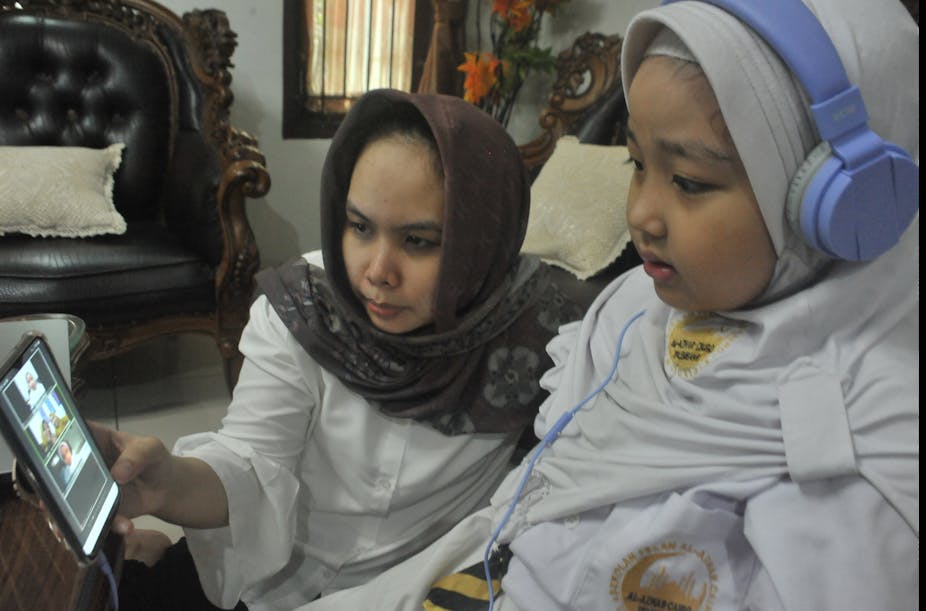COVID-19 has brought an unprecedented crisis to universities around the world. But female academics in Indonesian universities are facing additional constraints.
Women do not hold the highest-level executive positions in Indonesian universities. This results in gender biases in university policy-making.
Across the world, earlier research confirms the COVID-19 pandemic has led to women academics carrying heavy teaching burdens. This has left them with relatively little time for research and publication compared to their male colleagues.
Globally, the number of journal articles published by female academics declined during the pandemic.
Understanding the deeply gendered inequalities in universities and beyond must be approached with care. We carried out exploratory research on 27 Indonesian female academics working in the humanities and social sciences.
Our participants come from various geographical locations and private and public universities. This diversity allowed us to understand how gendered inequalities are experienced and practised in public and domestic settings.
We found that while Indonesian female academics carry added burdens and responsibilities of working from home, universities’ policies also sideline them.
Difficulties at home
The pandemic has forced all academics to shift their face-to-face teaching mode to online learning.
The sudden shift has meant many extra hours of work redesigning courses, checking assessment and procuring tools (such as internet connection and online teaching equipment).
Like many other working women and caregivers without secure employment, Indonesian female academics bear the double burden of paid work and unpaid care work.
The shift to online schooling for their students and their own children has added to their unequally shared domestic and caring responsibilities.
Unfortunately, Indonesian society and universities have deemed this inequality “normal”.
In most cases, the responsibilities have become so overburdening that our informants had to resort to hiring help.
An assistant professor in Aceh, who is married with two children, said if she could finish working from home while tending to her children, she would rather work from home. “But if I have to go to campus, I take my nine-year-old with me and my second child, 1.5 years old, will be with the nanny,” she said.
Read more: Indonesian scientists still struggle to include gender and minority perspectives in research
Difficulties at work
The blurring boundaries between work and home during the pandemic add to the struggle to balance work and caring responsibilities.
The pressure keeps mounting as universities try to keep up with the changing national policies in higher education during the pandemic.
The Indonesian government’s Autonomous Learning (Merdeka Belajar-Kampus Merdeka) policy requires universities to carry out major curriculum adjustments. They have to implement them by early 2021 at the latest.
Extra work for redesigning the curriculum amid the worsening pandemic has hindered female academics from completing the prerequisites for promotion, including writing for publications.
Most of our informants graduated from universities in developed countries. Most of them have found it difficult to write after their return to campus in a normal situation, let alone during the pandemic.
An assistant professor and study program secretary at an Islamic state university in West Java said she has not been able to write during the pandemic. Her secretarial position and work have been hindering her. “I can only write at home during the night with whatever energy I have left,” she said.
Our informants mostly hold middle-management positions at their universities. This creates another, different load.
While shouldering domestic work during the pandemic, they also have to care for the underprivileged staff under their supervision.
For example, a study program head in a public university in Jakarta told her administrative staff to work from home in response to the provincial government’s large-scale social restrictions. Yet the university had not issued any working-from-home policies.
Furthermore, the policies created by female academics in mid-level positions are never really mainstreamed throughout the university structure.
Surviving the pandemic
The pandemic brings to the surface matters that extend to larger and deeper issues of increasingly flexible work arrangements that exploit women and those in the care sector through overburdening and unpaid labour.
Ironically, we found this happens in universities and academia –- communities thought to be progressive and a source of social change.
Our research shows discourses of gender inequity, particularly pertaining to promotion of women’s leadership at universities, are not enough to overcome the systemic inequality that female academics experience.
Gender inequity is often considered to be an issue that has been solved, based on a superficial look at statistics on university lecturers or university enrolments by gender.
But the gendered nature of academic labour demonstrates how entrenched structural inequalities are.
The university promised to be the place that empowers women through the development of feminist and post-colonial critiques. Yet, at the same time, it has become the place that reproduces gendered exploitation.
To survive the pandemic and bounce back, leaders, including in universities, must rise to the challenge of producing policies that guarantee equal resource distribution.
This must be done by acknowledging unpaid labour by female workers.
So-called gender equality is only meaningful if women and caregivers can produce and mainstream policies in their institutions to ensure the structure protects the most vulnerable.
While women state leaders have emerged as role models in containing the pandemic, we believe advocating for female academics to be top leaders due to their gender is a mere technical solution to a structural problem.
Universities need leaders who practise caring policies, where collective, organisational compassion is valued alongside productivity and excellence.
They are leaders who understand context and know which kind of redistributive policies must be streamlined so the system does not privilege a few at the expense of many.
The authors would like to express deep gratitude and appreciation to all participants in the research for standing in solidarity and being part of voicing everyday experiences and larger systemic inequalities.


